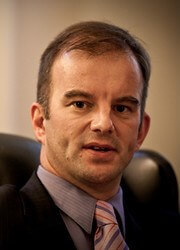
Dr. Carl R. Trueman
Church History and Theological Adviser
Dr. Trueman is a Professor of Biblical and Religious Studies at Grove City College, Pennsylvania.
He has an MA in Classics from the University of Cambridge and a PhD in Church History from the University of Aberdeen. He is the editor of the IFES journal, Themelios, and has taught on the faculties of theology at both the University of Nottingham and the University of Aberdeen. He has authored a number of books, including The Claims of Truth: John Owen's Trinitarian Theology and The Wages of Spin: Critical Writings on Historic and Contemporary Evangelicalism. He lives in Oreland, a suburb of Philadelphia, with his wife, Catriona, and his two sons, John and Peter.
Dr. Trueman is Church History and Theological Adviser to the Gospel Growth Fellowship.
He blogs at The Mortification of Spin.
Some of his articles are available online on these website:
Highlighted publications
- The Rise and Triumph of the Modern Self: Cultural Amnesia, Expressive Individualism, and the Road to Sexual Revolution (2020) (review)
- Reformation Theology: A Systematic Summary (2017)
- The Essential Trinity: New Testament Foundations and Practical relevance (2017)
- Grace Alone: Salvation as a Gift of God (2017)
- Luther on the Christian life: cross and freedom (2015)
- Minority Report: Unpopular Thoughts on Everything from Ancient Christianity to Zen Calvinism (2014)
- The Creedal Imperative (2012)
- The Real Scandal of the Evangelical Mind (2012)
- Fools Rush in Where Monkeys Fear to Tread: Taking Aim at Everyone (2012)
- Histories and fallacies: problems faced in the writing of history (2010, 2011)
- Reformation: yesterday, today and tomorrow (2000, 2011)
- Republocrat: Confessions of a Liberal Conservative (2010)
- Calvin, Barth and Reformed theology (2008)
- Engaging with Barth: contemporary evangelical critiques (2008)
- John Owen: Reformed Catholic, Renaissance Man (2007)
- The Wages of Spin Critical Writings on Historical and Contemporary Evangelicalism (2004)
- The Trustworthiness of God: perspectives on the nature of Scripture (2002)
- Protestant Scholasticism: essays in reassessment (1999)
- The Claims of truth: John Owen's Trinitarian theology (1998)
- Luther's Legacy: Salvation and English Reformers, 1525-1556 (1994)
Dr. Trueman on what Evangelicalism needs:
If Evangelicalism is to have a future connected to historic Christianity, then it will have to do a number of things. It will need to break the nexus of non-ecclesiastical and unaccountable platform, power, and money which currently appears to determine the boundaries of orthodoxy; it will need to recognize that errors on the doctrine of God have historically proved just as lethal to orthodoxy as those on scripture – if not more so; it will need to set its biblical theology in positive relation to systematic theology and the creedal and confessional heritage of the church; and it will need to think long and hard about how orthodoxy is transmitted from generation to generation.
Dr. Trueman on Modern Marcionism
So how does Marcion influence modern evangelicalism?
…First, the emphasis upon God's love to the utter exclusion of everything else has become something of a commonplace. We see this in the collapse of the notion of penal substitution as an evangelical doctrine. Now, maybe I'm missing something, but of all the things taught in the Bible, the terrifying wrath of God would seem to be among the most self-evident of all.
…Then, there is the constant tendency to neglect the Old Testament, in particular in our theological reflections, and our devotional lives also need to take full account of the Old Testament. We need to read the Bible as a whole, to understand each passage, each verse, within the theological and narrative structure of the canon as a whole.
Think truncated thoughts about God and you'll get a truncated God; read an expurgated Bible and you get an expurgated theology; sing mindless, superficial rubbish instead of deep, truly emotional praise and you will eventually become what you sing.
Indeed, there are mornings when I wake up and think it's already all over, and that the church in the West survives more by sheer force of personality, by hype and by marketing ploys rather than by any higher power. We need to grasp once again who God is in his fullness; we need to grasp who we are in relation to him; and we need teaching and worship which gives full-orbed expression to these things - and this will only come when we in the West grow up, ditch the designer gods we build from our pick-n-mix Bible where consumer, not Creator, is king, and give the whole Bible its proper place in our lives, thinking and worship.